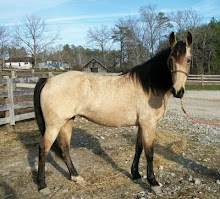Hallelujah! That's all I could think of as I kicked off my soaking barn boots and peeled off my wet socks. The water on my feet was just heavy morning dew that comes after a hot day... rather than water that is a result of a never-ending rain that seems to have hit Kentucky this spring.
This holiday weekend was blessed in weather terms. Yes, too hot! Yes, dry. But hallelujah, no rain! I hope the hay farmers got their crop cut and baled. I wonder if it is too late for corn, or if corn farmers were able to mud in their seeds earlier this spring.
I actually saw puffs of dust in my paddock as the horses played around. Rather than potholes of mud and slippery tracks where one slid trying to come to a stop.
I worry about what we have seen in the U.S. this spring, because according to the climatologists, global warming will gradually cause more of the unusual weather patterns.
If you live in a suburb and go to an office or school to work, the strange patterns of weather may depress your spirits, but it does not stop your income or your activities.
If, however, you are involved in an agricultural enterprise, whether raising crops, cattle or horses, the weather effects are much more devastating, more income-disruptive, more lifestyle changing.
When farmers had diverse farms with animals, row crops, fruit, vegetable gardens... they had much more of a chance of survival. Each of the farm products on a diverse farm are timed so that a wet spring may affect one but not so much the others. But now that we are all so specialized - if you raise JUST livestock (including horses), or JUST corn.. the weather can make you or break you at any time of year.
I'm not an agricultural specialist,but when you live on a small farm, you learn these lessons in miniature. The lettuce in the garden loved the rain but needed more sun to really grow. When it went from 50 degrees to 90 degrees overnight, from constant rain to sunny and hot, the lettuce growth exploded, but we have a limited window to harvest and eat it before it turns bitter from the sudden heat. (Salads every meal at the Grulke house).
What is the future for agriculture if weather patterns continue to be strange? Floods, droughts, hurricanes and tornadoes, ice storms, bitter winters, blistering summers.
If it happens occasionally, it's inconvenient, just Mother Nature showing us that we don't control the world (like Americans seem to think we do...).
If it happens routinely...gosh, I don't know what we will do. Hay will become very expensive because the supply will become unpredictable. Similarly for grain and sweet feed. At the same time, if pastures are soaked or flooded, the horse owner will need MORE hay and grain. It will become a challenge to get a horse ready for showing without an all-weather arena.
But for now, the sun is shining and summer has come to Kentucky. I watch my horses slowly swish their tails in the shade, and meander over to the water trough. A slight summer haze covers the distant ridge, and the grass in the shadows is deep emerald green. Birds flit overhead and a squirrel balances on a fence board.
It is hard to think of natural disasters, or temperamental weather when this beautiful and lazy Kentucky scene is laid out before your eyes. Pray for a good summer, crisp fall, and good times with our animals.
Tuesday, May 31, 2011
Subscribe to:
Posts (Atom)
